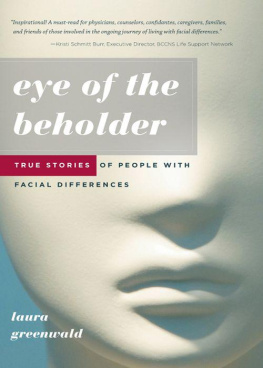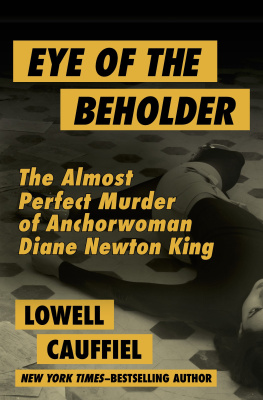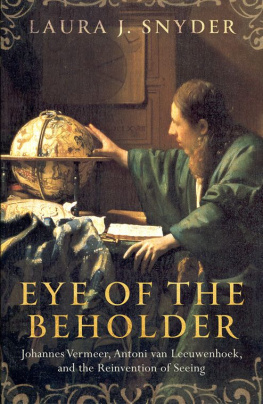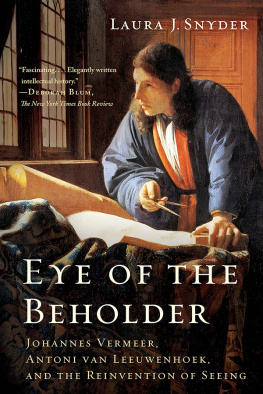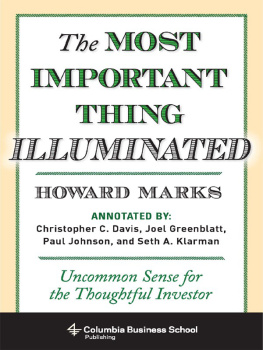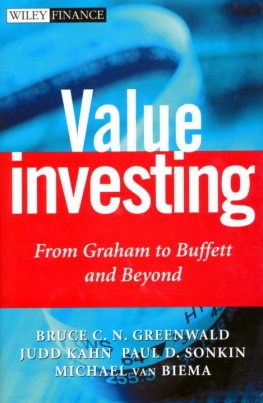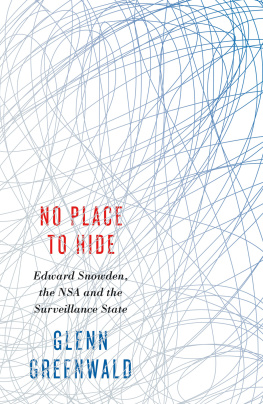Laura Greenwald - Eye of the Beholder: True Stories of People with Facial Differences
Here you can read online Laura Greenwald - Eye of the Beholder: True Stories of People with Facial Differences full text of the book (entire story) in english for free. Download pdf and epub, get meaning, cover and reviews about this ebook. year: 2009, publisher: Kaplan Publishing, genre: Home and family. Description of the work, (preface) as well as reviews are available. Best literature library LitArk.com created for fans of good reading and offers a wide selection of genres:
Romance novel
Science fiction
Adventure
Detective
Science
History
Home and family
Prose
Art
Politics
Computer
Non-fiction
Religion
Business
Children
Humor
Choose a favorite category and find really read worthwhile books. Enjoy immersion in the world of imagination, feel the emotions of the characters or learn something new for yourself, make an fascinating discovery.
- Book:Eye of the Beholder: True Stories of People with Facial Differences
- Author:
- Publisher:Kaplan Publishing
- Genre:
- Year:2009
- Rating:5 / 5
- Favourites:Add to favourites
- Your mark:
- 100
- 1
- 2
- 3
- 4
- 5
Eye of the Beholder: True Stories of People with Facial Differences: summary, description and annotation
We offer to read an annotation, description, summary or preface (depends on what the author of the book "Eye of the Beholder: True Stories of People with Facial Differences" wrote himself). If you haven't found the necessary information about the book — write in the comments, we will try to find it.
Laura Greenwald: author's other books
Who wrote Eye of the Beholder: True Stories of People with Facial Differences? Find out the surname, the name of the author of the book and a list of all author's works by series.
Eye of the Beholder: True Stories of People with Facial Differences — read online for free the complete book (whole text) full work
Below is the text of the book, divided by pages. System saving the place of the last page read, allows you to conveniently read the book "Eye of the Beholder: True Stories of People with Facial Differences" online for free, without having to search again every time where you left off. Put a bookmark, and you can go to the page where you finished reading at any time.
Font size:
Interval:
Bookmark:
eye of the beholder
TRUE STORIES OF PEOPLE
WITH FACIAL DIFFERENCES
Laura Greenwald

God made man because he loves stories.
Elie Wiesel, The Gates of the Forest
A portion of the authors proceeds benefits programs
to support people with facial differences.
In Eye of the Beholder, Laura Greenwald captures the spirit and voices of people with facial differences and their families, and gives us insight into the many issues they face in their everyday journeys. The difference that distinguishes each of these people is a facial anomaly: a facial difference acquired through birth, illness, or accident.
My interest in facial differences began in 1992, when I joined the board of Forward Face. Forward Face is a nonprofit organization in New York City that provides children and their families support to manage the medical and social effects of facial differences. The organization provides educational materials and networking for parents, raises public awareness, and sponsors Inner Faces, a support group for teens and adults with facial differences.
I volunteered to facilitate a series of communication and social skills workshops for the Inner Faces. Much time at the workshops was spent designing and performing role-plays. I was surprised at how much the Inner Faces enjoyed role-playing and how good they were at it. One of the members of the group suggested we enhance some of the role-plays to illustrate what the group had learned and perform them in front of an audience.
Early in my studies at the Fielding Graduate Institute, I was introduced to the work of Auguste Boal and the transformative power of the Theatre of the Oppressed. The convergence of my attendance at the Boal workshop and the groups interest in performing planted the seed that grew into a full-blown theater project, based on Boals work. The Inner Faces made a commitment to do participatory theater: to write, produce, and act in an original musical presentation, based on the stories of their lives growing up with facial differences.
The members of the Inner Faces began to believe in their ability to relate in the world and started to take a variety of risks. They were transformed and motivated by their theater work to help themselves, as well as to help others. With anticipation, fear, and much excitement, the Inner Faces performed their original musical, Lets Face the Music, to a packed audience on an off-Broadway stage in Tribeca. They received a standing ovation at every performance and much praise and recognition for their courage and accomplishment from strangers, friends, and family. Their stories and their voices were heard.
The next step was education to bring about social change and improve the quality of life for people with facial differences. The Inner Faces inspired me to write my dissertation about our theater project and transformation.
We developed the documentary Face, a Portrait, which is the centerpiece of Appreciating Differences, our educational program targeted to middle and high school students. The documentary has been aired on public television both nationally and internationally and is being shown in more than 4,000 schools all over the country.
A few years later, the Inner Faces performed their second participatory theater project, Phoenix Cafe, in an off-Broadway theater on Manhattans Upper West Side. Eight new members joined seven of the original cast. Since then, several of the members have developed into staunch social advocates and continually participate in programs in schools and universities, educating others about difference.
The members of the Inner Faces presently are involved in writing and producing an educational video for medical students who are interested in reconstructive surgery. The students will hear an honest and open discussion based on the real experiences of craniofacial patients. The Inner Faces will discuss what is important and often overlooked in the patient-doctor relationship. We will travel to many medical schools, show the video, and engage in an open dialogue with the medical community.
I have mentored and advised the Inner Faces for the last 14 years. Our legacy of caring, humanity, and love is being passed on through the groups evolving leadership.
In Eye of the Beholder, Laura Greenwald offers us the opportunity to learn more about facial differences by journeying with several people as they courageously search for acceptance and a life of dignity. In her timely book, Laura illustrates many of the issues surrounding facial differences: the different kinds of family support needed; the trauma of surgeries; the day-to-day contact with harassment and staring; the isolation and silence; and the difficulties in dealing with communication, relationships, and employment. She addresses the latest medical information from experts involved in all aspects of the field.
Eye of the Beholder helps people with facial differences move out of the shadows and into the spotlight. We are privileged to hear their voices. Laura is a compassionate and elegant writer who pays attention to the voices of these people and offers them center stage. I am thrilled that finally there is a comprehensive book that educates us on the many issues concerning facial differences and allows us to hear voices that might otherwise have been silent. Professionals and laypersons alike will learn and be inspired by this scholarly and heartfelt presentation.
Jodie Berlin Morrow, PhD
New York City
Look at me and really see
The kindness in my eyes,
The smile that twitches at my mouth
The fear that makes me shy.
Look at me and disregard
Those differences that stand,
Invisible as winter winds
And strong as steel bands.
When you look at me is all you find
The measure of my face?
Against some standard I cant meet
Do I lose the human race?
Do you see the things that I cant change?
Do you gaze and look away?
Its lonely here without your eyes.
One look then turn away?
The beauty of the human soul
Is not the pretty face.
Its found within the heart and hands
Of those who look and stay.
Jeff Moyer, son of Jack Moyer
(Chapter 7), January 2005
The perfect human being is uninteresting.
Joseph Campbell
H AVE YOU EVER RUN into someone whose face looked markedly different from those of others? Perhaps it was a child with something as common as a cleft lip. You stared for a few seconds and then turned away. Perhaps it was someone whose face was badly scarred from a fire. Maybe you couldnt stop staring. Either way, you probably felt uneasy and avoided any interaction with that person. Why? Because you didnt know what to say? Because you felt that somehow you would have to acknowledge the difference? Would you have the same reaction to a person in a wheelchair or a person missing an arm?
Even with all their variations, we know that faces are supposed to look a certain way. When we see one that doesnt fit our image of usual, were tripped up. For any object, whether its a spoon or a car or a face, were given visual clues so we can identify it easily. These visual clues help us to form an archetype of the image, a frame of reference. Once we know the archetype of a spoon, for example a long handle attached to a shallow bowl, usually made of metal we can easily identify all types of spoons, from simple to ornate to downright funky. When confronted with a spoon that is unlike its archetype and unlike all others weve seen, its likely we would spend some time observing it. Its the same with cars; its the same with faces.
Font size:
Interval:
Bookmark:
Similar books «Eye of the Beholder: True Stories of People with Facial Differences»
Look at similar books to Eye of the Beholder: True Stories of People with Facial Differences. We have selected literature similar in name and meaning in the hope of providing readers with more options to find new, interesting, not yet read works.
Discussion, reviews of the book Eye of the Beholder: True Stories of People with Facial Differences and just readers' own opinions. Leave your comments, write what you think about the work, its meaning or the main characters. Specify what exactly you liked and what you didn't like, and why you think so.

